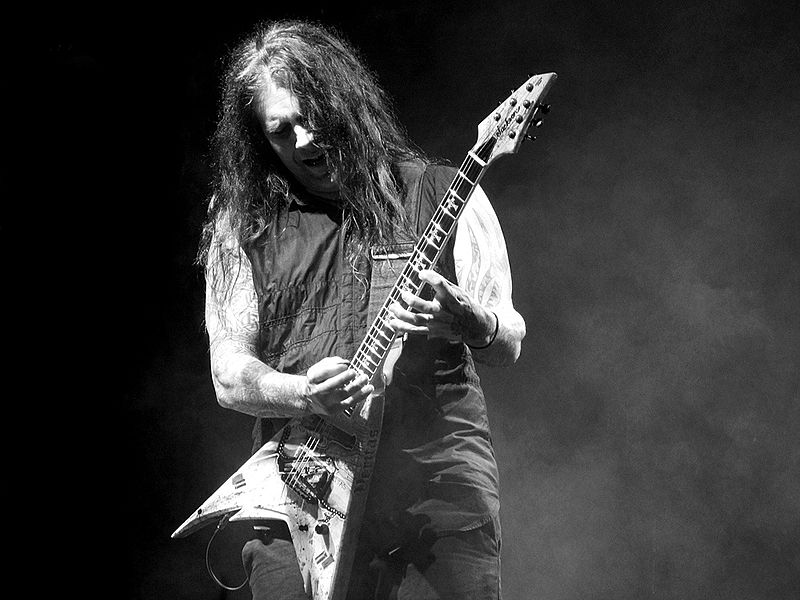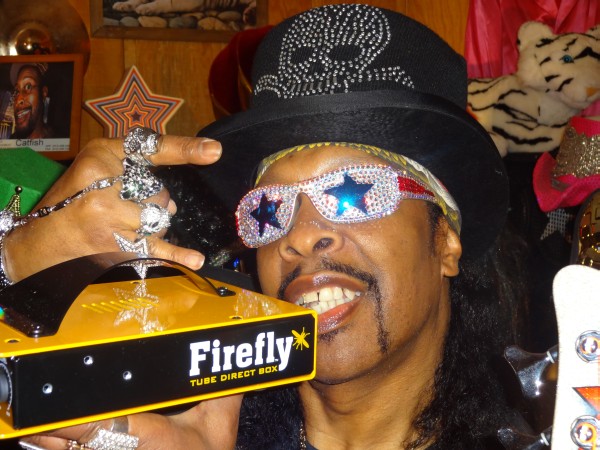Phil Demmel (Machine Head) in interview
With each and every record Machine Head pushes the boundaries of musical intensity and their own technical and compositional abilities with complex and emotionally loaded songs consisting of bone-crushing riffs, soul-piercing melodies and ear-ripping solos – the last being a trademark of Rob Flynn’s wingman Phil Demmel. We met with Phil at the Musikmesse 2013 show in Frankfurt to ask him a few questions about his recent career, the gear he uses and the band’s future. Enjoy!
Long before joining Machine Head you played in a band called Vio-lence – is that where you met Rob for the first time?
Phil Demmel: He was in a band called Forbidden Evil and they practiced by us, so I knew him from there. Then he joined Vio-lence, that’s how I met him.
I read you also played in a band called Torque…
Phil Demmel: Yeah, I did! After Vio-lence, when our singer quit, I basically took the remaining members of the band and started singing myself. We changed the band’s name to Torque, started tuning down and it sounded like Machine Head… [laughs] I quit that band in 1998, but we put a record out through Mascot Records.
Before you joined the band, Machine Head used to play more hardcore or nu metal-oriented music, while “Through the Ashes of Empires” and the following albums sound more thrashy and heavy – was that your musical influence on the bands style?
Phil Demmel: No, I think they made a cognitive effort to go in that direction before I joined. Machine Head has always been a band that’s not afraid to try different things. I wasn’t around at that time, so I don’t know how the decisions were made, but I think that, given my abilities and Rob and my history playing thrash [metal] together, it was already done before I joined.
I read on the internet that the change might have been due to some criticism the band received after “The Burning Red” and “Supercharger” albums…
Phil Demmel: I don’t think so. I think that they have always recorded what they wanted. “The Burning Red” was a great sounding record, I love it! They might have tried to write more for the radio signal, to explore the avenues that were available to get bigger [with their popularity], but I think that this band has always been focused on writing music for themselves.
So, while writing songs, what is your influence on the overall material?
Phil Demmel: I think I’ve had a lot of influence on it. Even when I started on “Ashes…” [“Through the Ashes of Empires”], I came in and brought the beginning to “In the Presence of My Enemies” and parts of other tunes. The beginning of “Seasons Wither” [US edition bonus track] was basically my idea. As you get to “The Blackening”, the percentage of what I wrote goes to about 1/8th of the music, and then I wrote 25% of “Unto the Locust”, both lyrics and music. Most people think that Rob writes everything but that’s just not the case.
“I’ve been fortunate enough to get my signature series from Jackson. I’ve been playing them for 28 years now, I got endorsed in 2003 and got my signature in 2007 which I play ever since.”
While recording in the studio, do you also lay down riffs or just the solos, leaving all the riff work to Rob?
Phil Demmel: Yeah, for the most part of “The Blackening” and on “Locust” Rob played the rhythms. We just found that one guy playing all the parts works better, and since he is a better rhythm player than me – he’s got better timing – he’ll do most of the rhythms. And then if there’s anything that I’m playing different, that isn’t exactly the same as his parts, I’ll play those and then play all my stuff, the solos.
That’s a common practice among metal bands: Metallica did that, Bullet For My Valentine does that…
Phil Demmel: Yeah, a lot of bands record this way. I think Lamb of God does that too, I think when Willie writes the riff, then he’ll do it and then Mark will do his rhythms. Whoever writes the riff, lays it down on the record, it just sounds better.
Did you also compose some of the acoustic and classical guitar parts or do you just focus on the electric parts?
Phil Demmel: Most of the classical stuff Rob would do, like “This is the End” and “I Am Hell”. I wrote the verses in “Darkness Within” [sings the melody] and the beginning of “A Farewell to Arms” [from “The Blackening” album], so I do some of the acoustic stuff too.
You have a long-term relationship with Jackson guitars – tell us about your axes!
Phil Demmel: I’ve been fortunate enough to get my signature series from Jackson. I’ve been playing them for 28 years now, I got endorsed in 2003 and got my signature in 2007 which I play ever since. I got some custom models which are a little different than the ones available in stores: I like an unfinished neck in the back and I get my Floyd Roses upgraded. But basically what I play are those guitars that are off the shelf.
What elements of your signature model are your ideas or suggestions?
Phil Demmel: Those cut-outs on the wings were my idea. On the ones that I play I don’t have any fret markers – I like a blank fretboard. My idea was also to have just two volume knobs, one for each pickup. I never used the tone control on a guitar for heavy metal, there are so many players that don’t use their tone controls, so I got rid of those.
“The advantage of Fractal AxeFX is shipping, because we do so much traveling, it’s just a smaller case and you don’t have to bring cabinets – and that’s also the disadvantage: I like having the push of the cab behind you but we just use in-ears.”
You play through Peavey amps, but lately started using Fractal’s AxeFX digital preamp – what are the advantages of this solution for you?
Phil Demmel: We’ve got a [Peavey] 5150 patch programmed into the AxeFX, so we’re getting pretty close to the sound of our amps. The advantage of Fractal is shipping, because we do so much traveling, it’s just a smaller case and you don’t have to bring cabinets – and that’s also the disadvantage: I like having the push of the cab behind you but we just use in-ears. You can program just any tone you want on the AxeFX and with the head it takes a little more time to get.
Do you use any stompbox effects?
Phil Demmel: Oh yeah, we use a lot of these: Electro-Harmonix Electric Mistress, MXR Phase 90, MXR Fuzz, Boss Acoustic Simulator, Boss DD-7 Delay, Boss CH-1 Super Chorus. I’m using a Whammy, trying to incorporate that. I also use a Dunlop Zakk Wylde Wah but I put it into the Buddy Guy Wah casing with polka dots [laughs while showing us his iPhone covered in black with white dots as well] – it’s all for Randy Rhoads…
What do you think of seven string guitars?
Phil Demmel: I never got into it, we have a bass player for it, you know [laughs]. Although there’s a song we’re tuning down the lowest string from drop-B to F#, so we have an octave of two F#s in the bottom. It’s really heavy, Rob’s eyes are all lit up with “aah that’s so heavy”! It’s probably from listening to too much Deftones [laughs].
Well, actually you have no bass player now – you have recently opened auditions for Machine Head’s new bassist. How is it going?
Phil Demmel: We just started looking at the prospects, we’re at the very beginning of that.
So there’s no strong candidates yet?
Phil Demmel: Not yet, probably next month we’re gonna be looking at people.
What are you guys doing right now?
Phil Demmel: We’re writing the new record, we have about 4 or 5 songs done. I’m doing a clinic tour for Jackson for the next two weeks. We’re going to play the Mayhem Tour in the States with Rob Zombie and Five Finger Death Punch and hoping to get in the studio by October.
When can we expect the next Machine Head album?
Phil Demmel: The record should be out early next year.
Fingers crossed for your upcoming album and finding a new bass player!
Phil Demmel: Thanks!
Interview: Mikolaj Sluzewski




